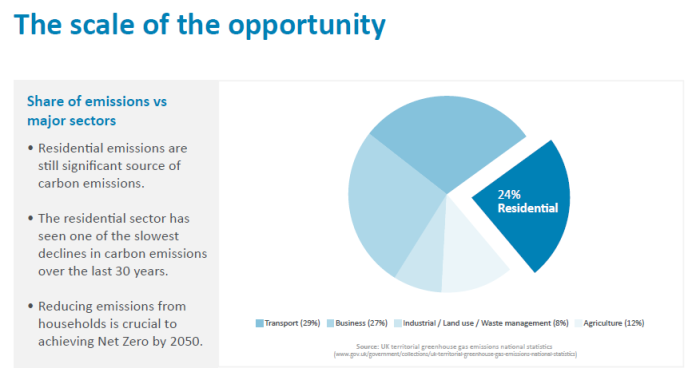80 million home windows need to be replaced if the UK hopes to meet the government’s net zero targets.
That is just one of the alarming statistics revealed in a report, ‘A Window of Opportunity’, jointly published by the Glass and Glazing Federation (GGF) and British Glass. This is the most extensive report in the Glazing industry to date, publishing results from extensive research on heat loss in homes and the contribution that modern windows can make to keeping people’s homes warm.
When it comes to heat loss in a home, the UK currently has the least efficient housing stock in Western Europe and has seen one of the worst carbon reductions of all sectors since 1990.
The report demonstrates that replacing older double glazed windows with new windows that meet current standards can reduce heat loss in an already insulated home by half, from 44% to 22%.
Other figures that are certain to shock millions of homeowners are:
- 80 million windows would benefit from being replaced now
- The UK’s housing stock is the worst performing country in Western Europe in terms of heat loss, and three times less energy efficient than Germany
- Double glazing installed pre-2002 is in approximately 23% of the UK’s current housing stock and is 50% less energy efficient than new windows to current standards
- 22% heat saving could be achieved in properties that have already been insulated to best practice if pre-2002 windows are replaced
- Homes fitted with new windows to current standards could see a saving of up to £395 per year
- 24% of the UK’s carbon emissions come from the residential sector
- Replacing pre-2002 double glazing with new double glazing to current standards is the equivalent of taking 1.88 million cars off the road
Chris Beedel, Head of Advocacy at the GGF, said: “We are in continuous discussion with the government about net zero targets and the positive contribution that would be made if older double glazed windows were to be replaced. As the government looks to achieve net zero, it is clear homeowners and our industry have a vital role to play.
“We are well aware of the current state of the economy, and as the government requires higher energy efficiencies from new windows, there needs to be real incentives for homeowners to make the necessary change to new windows.”
Chris continues: “The residential sector currently contributes to almost a quarter of the entire country’s carbon emissions. This needs to change – reducing emissions from households, and therefore improving glazing, is crucial in helping reach net zero, which we are all committed to.”
Natalie Little, President of the GGF, said: “This report may come as a surprise to homeowners, and the government. In the last two decades, replacement window and door technology has developed enormously through manufacturing and improvements in plastics, glass and metals.
Natalie, who also acts as Commercial Director of truhouse., her family’s home improvement company based in Stroud, Gloucestershire, added: “Today’s double and triple glazing is light years ahead of what was available 20 years ago with windows installed today performing 50% better than old double glazing and 70% better than single glazing. Almost a quarter of the UK’s homes have double glazing that is at least 20 years old and therefore doesn’t meet today’s standards and would benefit from immediate replacement. It’s like driving a 20-year-old car. It will get you from A to B but will not be as fuel and emissions efficient as a new car.
“Standards are constantly under review and we await the government consultation on the Future Homes Standard for new build homes which could see a move to triple glazing and much more stringent energy efficiency requirements.”












